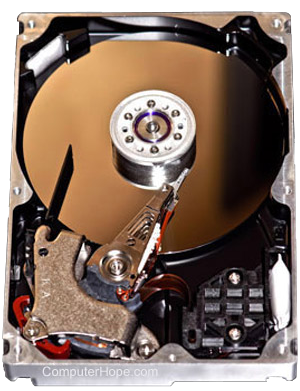Permanent storage

Permanent storage, also called persistent storage, is any computer data storage device that retains its data when it's unpowered. A common example of permanent storage is the computer's hard drive or SSD.
Examples of permanent storage devices
- Blu-Ray disc
- CD-ROM (Compact Disc Read-Only Memory) disc
- CD-R (Compact Disc Recordable) and CD-RW (Compact Disc Re-Writable) disc
- DVD-R (Digital Versatile Disc Recordable), DVD+R, DVD-RW (Digital Versatile Disc Read/Write), and DVD+RW disc.
- Floppy diskette
- Hard drive
- Jump drive or flash drive
- Memory card
- Memory stick
- SSD (Solid-State Drive)
Non-permanent storage
Compared to permanent storage, non-permanent storage, also called volatile memory, is a storage device whose data is lost when its power source is disconnected. Examples of non-permanent storage include CPU (Central Processing Unit) cache and RAM (Random-Access Memory).
How they work together
Permanent and non-permanent storage devices have advantages and disadvantages that complement each other. They work well in conjunction because each does something well that the other does not.
Non-permanent storage operates faster than persistent storage (its data is accessed at a lower latency). However, it is more expensive to manufacture. Therefore, it is manufactured in smaller capacities, and the computer uses it as a scarce resource for the most time-critical applications.
Permanent storage operates more slowly than non-permanent storage but is cheaper to manufacture. Its primary use is long-term data storage for your operating system, applications, and documents. When you use a specific application, that data is loaded into RAM (non-permanent storage), which operates quicker.
Generally, the slower storage is, the larger its capacity. For instance, a computer may have a 2 TB hard drive and a 256 GB SSD for permanent storage. The same computer may use 16 GB of RAM and 9 MB of CPU cache as volatile storage. The slowest, cheapest storage (the hard drive) has the largest capacity, and the fastest, most expensive storage (CPU cache) is the smallest.
CD, DVD, Hard drive, Hard drive terms, ROM, SSD, Storage device, USB flash drive
